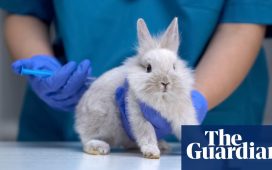Eggs from battery hens will return to British supermarket shelves if the government fails to strike a new trading deal with the EU and crashes out of the bloc, the National Farmers’ Union has warned.
The NFU says the government has ignored its pleas to put tariffs on eggs to protect against cheaper rivals from countries such as the US where caging hens is allowed.
“We will be importing eggs produced in those very same cages we banned in 2012,” said the NFU president, Minette Batters.
Tariffs on farm and other produce will come in at the end of the transition period after Brexit whether a deal with the EU is done or not, and will affect all imports from third countries.
But the NFU is baffled by the decision by the government to put tariffs on lamb to protect vulnerable sheep farmers, but not to impose them on eggs or wheat.
The NFU wrote to the Treasury immediately after it announced its draft tariff schedule in March pointing out the risks its plan was creating for three agriculture products: eggs, horticulture and grains.
In its final tariff schedule published three weeks ago the three categories were rated at zero, meaning US producers, who can raise laying hens more cheaply because of the intensity of battery farming, will be able to undercut British eggs.
Batters said the NFU had begged the new environment secretary, Theresa Villiers, to think again about the final tariff schedule, but that all the minister was interested in was “leaving the EU on 31 October, deal or no deal”.
“There is no engagement on the issues,” she said.
Asked how the government had responded when told of the urgency of imposing tariffs, Batters said: “They just shrug their shoulders.
“We represent small family farming businesses and those farmers are not being allowed a say at all. They are just effectively going to be put out of business with a tariff schedule … [that the government] are not even prepared to look at again. And this is a party that proposes to represent rural Britain?”
On Sunday the international trade secretary, Liz Truss, insisted the government would “walk away” from negotiations with Washington if a deal was not “right for Britain”.
She told John Pienaar on BBC Radio 5 Live the government was “not going to alter domestic standards for the sake of trade deals”.
But the NFU argues that the trading environment for egg and wheat farmers will change even if there is no trade deal with the US.
“If you have 0% tariffs on eggs, how are you going to stop eggs, particularly liquid and dried egg, coming into the UK that has been produced in systems that are illegal in the UK?” said Batters.
“We do not want to see deregulation on animal welfare. The general public don’t either, but do they realise this is happening?”
The Department for the Environment, Food and Rural Affairs (Defra) said tariffs would only be imposed for 12 months before new deals were struck, but the NFU said that would be too late for some egg producers, who risked going out of business in the face of cheap competition.
“We have driven one of the safest food systems in the world – food traceability, farm-assured red tractor, RSPCA and others – and where is the democracy in making this decision? Parliament hasn’t discussed this. There has been no Panorama programme on it. How do you hold the PM to account?” said Batters.
Egg production is a hugely successful business in the UK, with 90% of the 12bn eggs consumed a year laid by British hens, and the NFU cannot understand why a British government does not want to protect it.
“Farmers feel betrayed. If this is what is going to happen, it is going to put some people out of business, as simple as that – the simple law of markets and economics,” Batters said.
The government is legally obliged to publish a tariff schedule under World Trade Organization trading and revealed what rates it had settled on in March with a draft schedule for every potential import from cars to agriculture.
Defra said in a statement: “We will make sure that Brexit works for farmers across the whole country and will not compromise on our high food or animal welfare standards when we leave the EU.
“Our temporary tariff regime will also balance support for British jobs, protect sensitive farming sectors and avoid consumer price increases should we leave the EU without a deal on 31 October.”











